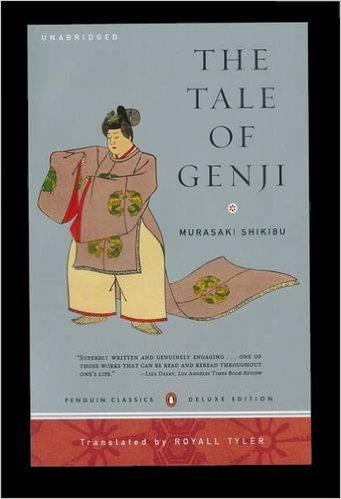The Tale of Genji
Murasaki Shikibu
 He is the son of the emperor’s favourite concubine. As such, he is too far down in the line of succession to every ascend to the throne, so his father removes him completely by making him a commoner and bestowing the name “Genji” onto him. Genji is nevertheless raised in the palace and is almost unanimously loved at court. Growing up, he shows many talents in writing poetry, calligraphy, music, and in charming women of all ranks. His numerous conquests get him banned from court twice. Twice does he have to settle in a remote area, twice even there women fall for his charms, and twice is he reinstated at court after a while. Genji is a lovable character, and although a womanizer, he always takes care of his lovers in one way or the other, even after the end of their relationship. Only the lady Murasaki (meaning purple) can capture his affections throughout her life, and Genji is heartbroken at her death and dies soon afterwards.
He is the son of the emperor’s favourite concubine. As such, he is too far down in the line of succession to every ascend to the throne, so his father removes him completely by making him a commoner and bestowing the name “Genji” onto him. Genji is nevertheless raised in the palace and is almost unanimously loved at court. Growing up, he shows many talents in writing poetry, calligraphy, music, and in charming women of all ranks. His numerous conquests get him banned from court twice. Twice does he have to settle in a remote area, twice even there women fall for his charms, and twice is he reinstated at court after a while. Genji is a lovable character, and although a womanizer, he always takes care of his lovers in one way or the other, even after the end of their relationship. Only the lady Murasaki (meaning purple) can capture his affections throughout her life, and Genji is heartbroken at her death and dies soon afterwards.
Genji Monogatari can be called a biography of a Japanese courtier of the 10th century. Although fictional, it depicts court life in great detail: its intricate politeness (never use personal names), its unbelievable etiquette (unrelated men and women are always separated by screens), and its numerous festivals and ceremonies. The Tale of Genji is considered the earliest and finest example of Japanese literature.
The book was written by a lady-in-waiting of the Heian court in Kyoto. Not much is certain about her, not even her real name, so she is named after the main female character in the book, Murasaki Shikibu.
I found Genji Monogatari a worthwhile book, but rather difficult to read, it took me about three months. There is not much going on, it is a biography after all, but the immense number of characters, most of which are never referred to by name, but rather by their ever changing ranks at court, makes the story difficult to follow at times. I have read the unabridged translation by Royall Tyler from 2001 containing lots of footnotes that help understanding the implicit intricacies of the time, but sometimes you still have to remind yourself that the conversation recorded could not have taken place like this, but was conducted either in written letters or with servants as go-betweens.
Check this book out on amazon.
